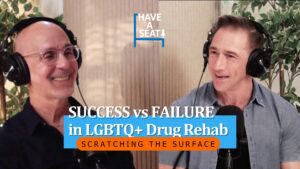Trauma, stemming from violence, abuse, or accidents, can have long-lasting psychological effects if left untreated. Often, these effects contribute to substance abuse as people attempt to cope with their pain. By addressing and healing trauma, people can break free from the destructive cycle of addiction and pave the way for lasting recovery.
Keep reading to learn more about why healing trauma is important for addiction recovery.
See what La Fuente is doing to break the cycle of trauma and addiction. Call us at 888.903.9898.
What Is Trauma?
Trauma is a psychological response to an event that adversely affects a person emotionally or physically. It can result from incidents like violence, the death of a loved one, natural disasters, sexual assault, emotional and physical abuse, accidents, and neglect.
For some people, the trauma response may subside within a month. However, for others, trauma can have long-lasting effects if left untreated.
Symptoms of untreated trauma include:
- Anxiety, depression, and other forms of mental illness
- Sleep troubles, such as night terrors, sleep paralysis, and insomnia
- Feeling numb and emotionally detached from daily experiences
- Extreme feelings of anger and sadness
- Emotional dysregulation, including outbursts or isolating behaviors
- Feeling shame about the traumatic experience or denying it altogether
- Physical symptoms such as ulcers, liver damage, and high blood pressure
The Connection Between Trauma and Addiction
Trauma doesn’t always lead to addiction. Multiple factors play a role, including genetics, environment, and personal resilience. However, there’s no denying that trauma’s psychological impact contributes to addiction in many cases.
Some ways trauma influences addiction include:
Self-medicating: Using substances to alleviate intense trauma-related emotions temporarily.
Numbing: Engaging in addictive behaviors to avoid painful memories and triggers.
Emotional regulation: Using substances or behaviors to manage intense emotions stemming from trauma.
Dissociation: Escaping reality through substance use or addictive behaviors.
Co-occurring disorders: Trauma often leads to conditions like PTSD, anxiety, or depression, increasing the risk of addiction.
Neurobiological changes: Trauma can alter brain structure and function, affecting reward pathways and decision-making processes.
Why Healing Trauma Is Important for Addiction Recovery
Unaddressed trauma can be a major trigger for relapse in addiction recovery. When painful memories or emotions resurface, many find themselves overwhelmed and resort to using substances as a coping mechanism. By confronting and healing from trauma, people can uncover the deeper roots of their addiction and avoid unconsciously sabotaging their recovery.
Healing trauma is also vital for breaking the destructive trauma-addiction cycle. This vicious circle occurs when substance abuse makes trauma symptoms worse, which in turn drives further addiction. Left unchecked, this cycle can spiral, leading to deteriorating mental health, fractured relationships, and a reduced quality of life.
Therefore, addressing trauma during addiction treatment is crucial. This integrated approach offers the best chance at breaking the trauma-addiction cycle, paving the way for lasting recovery.
How to Heal Trauma and Addiction
Healing from trauma is unique to each person. It can be a messy and unpredictable process, often requiring survivors to confront long-suppressed memories and emotions. This may involve revisiting painful experiences and reframing personal narratives more positively.
Crucial to this process is understanding the intricate relationship between trauma and addiction, including how childhood experiences shape adult behaviors and the internal mechanisms that contribute to addictive patterns.
Various therapeutic approaches can aid in healing from both trauma and addiction.
Cognitive-behavioral therapy (CBT): Helps individuals recognize and modify harmful thought patterns and behaviors, then replace them with supportive coping mechanisms.
Dialectical behavior therapy (DBT): Incorporates mindfulness techniques to improve emotional regulation and distress tolerance.
Mindfulness and meditation: These practices encourage present-moment awareness and non-judgmental acceptance of thoughts and feelings.
Group therapy and supportive communities: These settings provide opportunities for connection, validation, and mutual support among individuals facing similar challenges.
Help for Trauma and Addiction at La Fuente
Many LGBTQ people have experienced trauma in the form of homophobia, harassment, or discrimination. For many, this is a recurring experience, contributing to higher rates of depression, anxiety, and suicidality within our community.
Given these circumstances, it’s understandable that the LGBTQ community also experiences higher rates of substance abuse.
La Fuente Hollywood Treatment Center can help.
We offer dual-diagnosis treatment and our counselors, many of whom are part of the LGBTQ community themselves, use a range of therapeutic techniques, including cognitive-behavioral therapy (CBT), dialectical behavior therapy (DBT), motivational interviewing, and family systems therapy. Additionally, we provide proven alternative therapies such as mindfulness, therapeutic yoga, and art therapy.
Call us today at 888.903.9898 and see why we’re one of the nation’s leading LGBTQ-affirmative addiction treatment centers.




